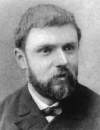 (source)
(source)
|
Henri Poincaré
(29 Apr 1854 - 17 Jul 1912)
French mathematician, physicist and astronomer , who is often described as the last generalist in mathematics.
|
Henri Poincaré Quotes on Definition (7 quotes)
>> Click for 95 Science Quotes by Henri Poincaré
>> Click for Henri Poincaré Quotes on | Fact | Mathematics | Mind | Science | Solution | Truth |
>> Click for 95 Science Quotes by Henri Poincaré
>> Click for Henri Poincaré Quotes on | Fact | Mathematics | Mind | Science | Solution | Truth |
Les principes sont des conventions et des définitions déguisés.
Principles are conventions and definitions in disguise.
Principles are conventions and definitions in disguise.
— Henri Poincaré
From La Science et l’Hypothèse (1902), 165. Translation by George Bruce Halsted, Science and Hypothesis (New York, 1905), 100. In Science and Hypothesis (London 1905), 138.
Chance ... must be something more than the name we give to our ignorance.
— Henri Poincaré
In Science and Method (1908) translated by Francis Maitland (1914, 2007), 66.
Every definition implies an axiom, since it asserts the existence of the object defined. The definition then will not be justified, from the purely logical point of view, until we have ‘proved’ that it involves no contradiction either in its terms or with the truths previously admitted.
— Henri Poincaré
…...
Exactness cannot be established in the arguments unless it is first introduced into the definitions.
— Henri Poincaré
In Science et Méthode, as translated by Francis Maitland, in Science and Method (1914), 123-124.
Geometrical axioms are neither synthetic a priori conclusions nor experimental facts. They are conventions: our choice, amongst all possible conventions, is guided by experimental facts; but it remains free, and is only limited by the necessity of avoiding all contradiction. ... In other words, axioms of geometry are only definitions in disguise.
That being so what ought one to think of this question: Is the Euclidean Geometry true?
The question is nonsense. One might as well ask whether the metric system is true and the old measures false; whether Cartesian co-ordinates are true and polar co-ordinates false.
That being so what ought one to think of this question: Is the Euclidean Geometry true?
The question is nonsense. One might as well ask whether the metric system is true and the old measures false; whether Cartesian co-ordinates are true and polar co-ordinates false.
— Henri Poincaré
In George Edward Martin, The Foundations of Geometry and the Non-Euclidean Plane (1982), 110.
What is a good definition? For the philosopher or the scientist, it is a definition which applies to all the objects to be defined, and applies only to them; it is that which satisfies the rules of logic. But in education it is not that; it is one that can be understood by the pupils.
— Henri Poincaré
Science and Method (1914, 2003), 117.
What, in fact, is mathematical discovery? It does not consist in making new combinations with mathematical entities that are already known. That can be done by anyone, and the combinations that could be so formed would be infinite in number, and the greater part of them would be absolutely devoid of interest. Discovery consists precisely in not constructing useless combinations, but in constructing those that are useful, which are an infinitely small minority. Discovery is discernment, selection.
— Henri Poincaré
In Science et Méthode (1920), 48, as translated by Francis Maitland, in Science and Method (1908, 1952), 50-51. Also seen elsewhere translated with “invention” in place of “discovery”.
See also:
- 29 Apr - short biography, births, deaths and events on date of Poincaré's birth.
- The Value of Science: Essential Writings of Henri Poincaré, by Henri Poincaré. - book suggestion.

 In science it often happens that scientists say, 'You know that's a really good argument; my position is mistaken,' and then they would actually change their minds and you never hear that old view from them again. They really do it. It doesn't happen as often as it should, because scientists are human and change is sometimes painful. But it happens every day. I cannot recall the last time something like that happened in politics or religion.
(1987) --
In science it often happens that scientists say, 'You know that's a really good argument; my position is mistaken,' and then they would actually change their minds and you never hear that old view from them again. They really do it. It doesn't happen as often as it should, because scientists are human and change is sometimes painful. But it happens every day. I cannot recall the last time something like that happened in politics or religion.
(1987) -- 


